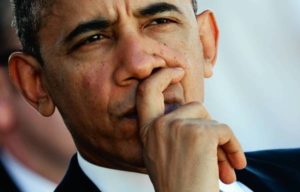
First of all, the comments reveal a real ignorance about the president’s biographical history because anyone who knows even a little about President Barack Obama knows that he had no African slave ancestors. As far as we know, no one in his family was ever a slave for 12 years or even 12 minutes. Obama’s father was, in fact, a Black African international student at Harvard who later went on to become an African public minister.
If President Obama looks back at his family tree on his African side, he will not find a legacy of slavery, but he will instead take comfort in the fact that he comes from a place where Black people are not categorized as quadroons, maroon and mulattos. His father came from an African country where Black people are simply Black. A place where ELA and the standardized math test scores are not combed annually for statistics that support the racial inferiority of Blacks and Latinos and the racial superiority of whites and Asians. His father came from a country with a Black majority and so Black surgeons, doctors, psychiatrists, engineers, computer programmers, professors and, yes, even presidents were the norm. If I were President Obama, especially now, I would certainly take comfort in that background.
On the other hand, the president’s grandparents were middle-class white Americans. His grandfather was a World War II veteran and no doubt taught him what it means to be a very good American. Why do so many resist the notion that President Obama identifies strongly with his white American family tree as well and doesn’t want to trade one side for the sake of the other? After all, President Obama didn’t even have a relationship with his biological father whose most memorable meeting with him occurred when Obama was 10 years of age and never afterwards. Are we superimposing our versions of the historical Black male leader onto President Obama? Perhaps if we stop looking at President Obama through a typical politically correct Black American historical narrative, we will no longer be surprised by his reactions to current events as they unfold. As long as we do, we will always be surprised when he doesn’t respond in the way we expect. President Obama doesn’t have a post-slavery, post-Jim Crow perspective and never will. He is not Frederick Douglass, Booker T. Washington, W.E.B Du Bois or Martin Luther King. He is not the “hope of the slave” in the sense in which the great Dr. Maya Angelou wrote about African-American slave descendants in the poem “And Still I Rise.” In terms of American history, he is probably closer to President Abraham Lincoln, well loved by many for showing courage and taking correct actions with regard to the Emancipation Proclamation in the face of tumultuous opposition, but basically with political and not moral motivations.
One probable truth about the president is that he is just now, in a trial by fire, beginning in these last two years of his presidency along with many others to understand the intense racial attitudes and divide that still exist in some pockets of America with protections that most do not have and cannot afford.
The president’s youth was spent with his mother in Hawaii and Indonesia, where people did not fixate negatively on his race, and then with white grandparents who probably just loved him simply for who he was: their grandson. His mother and grandparents no doubt sheltered him from many aspects of racial prejudice in the United States. Although President Barack Obama’s mother tried to teach him about many African-American historical figures, learning about these cultural icons second-hand can never take the place of the generational teaching experienced through contact with the Black church, the Black community and the persistent influence of Blackness and society’s reaction to it in daily life.
Perhaps one of the main reasons that many white Americans feel comfortable with the idea of Barack Obama as their first Black president is that he does not come with the accompanying white guilt of slavery. President Barack Obama himself is effectively at Black American ground zero because like “The Brother from Another Planet” or “Kunta Kinte” from “Roots” he is the first in his family line from Africa to experience the unique language of oppression used against him in America.
When it comes to historical references, what Barack Obama does have that most Black Americans don’t but wish they did is a direct recent cultural identity attached to Africa in less than one generation back. What he can offer Black Americans and non-Black Americans alike is an understanding that it takes several generations, and not just a few years for a group of people to develop PTSD as a result of laws that persistently treat them as less than human. What we can learn from Barack Obama is that it takes more than a few years for a person to develop a mentality enslaved by past injustices, where daily life becomes filtered through a racial lens. Perhaps what President Obama demonstrates in his bearing and stride is what a Black man looks like when we subtract years of slavery, Jim Crow, cruelty and fear. He presents an uncompromising picture of individuality triumphing beyond racial expectations when a man is “Nothing but a Man.” What President Obama will gain from his White House experience and can then pass down to his children for generations to come will be a richer, wiser, humbler, more authentic experience as a Black man than he ever had before taking office and maybe just maybe he will use his experience in the private sector as have former Presidents Jimmy Carter and Bill Clinton.
Leonore Tucker is a Poet/Writer. She studied literature and writing at New School University. She lives in New York but has deep Southern roots.


